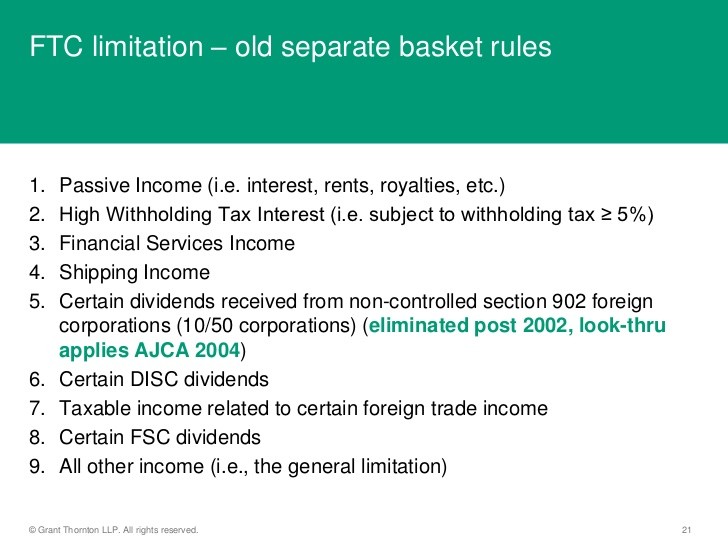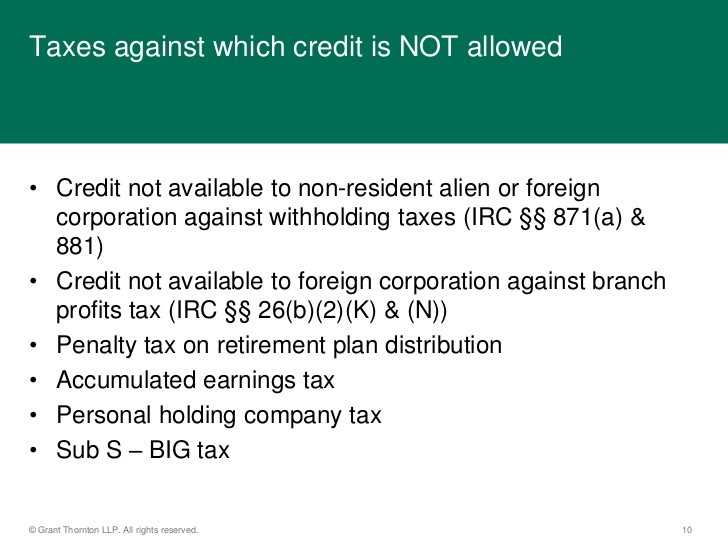Foreign Tax Credit And Withholding Tax Rates
Post on: 16 Август, 2015 No Comment

Introduction
I am a US-resident dividend-yield and dividend-growth investor. Most of my current holdings are U.S. companies but over the last couple of years, I have diversified into foreign equities. I do not restrict myself to only U.S. companies and feel that in the future the high-level of U.S. debt may come to haunt the U.S. financial system.
As I invested in more foreign stocks, I found that the domicile government of the foreign company often withholds taxes out of the dividends distributed by the company. This is similar to the withholding taxes taken out of the paycheck of a salaried employee in the U.S. An investor needs to be aware of the impact of such withholding taxes on the effective dividend yield of the foreign stock.
Foreign Tax Credit
Luckily, the U.S. tax laws provide for a credit for foreign taxes paid that help mitigate the impact of withholding taxes on foreign dividends. Some key points related to foreign tax credit are:
- An individual investor can file for tax credit on Form 1040 if the shares are held in a regular brokerage account and the investor received a Form 1099-Div form which lists the foreign taxes paid.
- An individual claims a dollar-for-dollar credit (and not an income deduction) for the foreign taxes paid.
- The amount is a credit against any U.S. taxes paid. Thus, even if foreign taxes were withheld but no U.S. taxes are owed then a refund cannot be claimed. This may not be important for most investors with active employment and salary but could be serious for retired investors living, for example, on social security income.
- An individual can claim foreign tax credit of up to $300 ($600 for married filing jointly) directly on Form 1040.
- Amounts greater than $300 (or $600) require use of Form 1116. This form is also required if the investor is carrying forward/backward any foreign taxes.
- Foreign tax credit cannot be more than the total U.S. tax liability multiplied by a fraction. The fraction is = (income from foreign sources) / (total taxable income from U.S. and foreign sources).
- There is a rather simple and easy to read topic about Foreign Tax Credit on the IRS website. Further detailed information is available on the IRS page for Foreign Tax Credit .

I must remind the reader that I am an individual investor, not qualified nor skilled to impart income tax knowledge or give advice on filing returns. Each investor must do their own due diligence and consult a qualified tax accountant for all tax matters. I just introduce the reader to various aspects of foreign investing.
Tax-Advantaged Accounts
The impact of foreign withholding taxes on tax-advantaged accounts like Traditional IRA, Roth IRA, 401(k), etc. is different. There is no income tax return to be filed every year so any foreign taxes withheld on shares held in a tax-advantaged account is lost forever. This can substantially reduce the effective dividend yield of foreign stock held in a tax-advantaged account. However, there are a few countries that either do not withhold any taxes on dividends or do not withhold taxes on dividends paid to shares held in tax-advantaged accounts of U.S. resident investors. An investor should only buy stocks of companies from such countries in the tax-advantaged accounts to avoid losing taxes to the foreign country.
Other Aspects of foreign taxes
Some other aspects of foreign withholding taxes are discussed below:
- Each country has a rate at which taxes are withheld on dividends distributed by a domicile company. However, most countries have a tax-treaty with the U.S. as well. Some of these treaties have a provision that brings down the rate at which taxes are withheld for U.S. resident investors. Unfortunately, this isn’t as straightforward as it should be. It appears that the reduced rate of foreign taxes requires the broker or the depository receipt bank to file appropriate paperwork with the foreign authorities to get a lower rate of return. This means that withholding rate may differ for different investors depending on who their broker is.
- In some cases, the individual investor may be able to file paperwork independently with the foreign tax authorities and claim the difference between the typical withholding rate and the reduced rate for U.S. investors. However, I have personally never tried it and do not know of any fellow investor who has used it so am not sure how easy or effective it is.
- The tax rate in the table below is for general equities and excluded instruments like preferred stock or REITs. I have not yet looked at these
Table of Withholding Tax Rates
As I started investing in foreign equities, I started creating a table of withholding tax rates by the country. This has helped me reconcile the dividend amounts that I receive as well as figure out if I can buy certain stocks in my Roth IRA account. I do not have any Traditional IRA or 401(k) accounts but I do have funds in Roth IRA and I want to ensure that I only buy stocks that do not have foreign withholding taxes. Please remember the following points as you refer to the table:
- The tax rates in the following table are not cast in stone. I have collected the data in the table from company websites, IRS.gov, TopForeignStocks.com, Deloitte.com, and from personal experience having been invested in some stocks.
- I have heard from fellow investors that more or less taxes have been deducted than one would normally expect; e.g. Brazil should be 0% tax rate but there have been cases where withholding taxes have been deducted for Petroleo Brasileiro (NYSE:PBR ).
- Some countries charge lower withholding tax rate than typical non-resident rate based upon tax treaties with U.S. However, an investor may not always benefit from this because the broker/depository receipt manager may not file the required paperwork or because the investor needs to file the paperwork himself/herself or for some other unknown reason.
- The stocks are from my watch list. They are not necessarily recommendations.
- I am not qualified to give tax advice. Consult your own tax professional.
I look forward to hearing from fellow investors about their experiences related to investing in foreign stocks.














